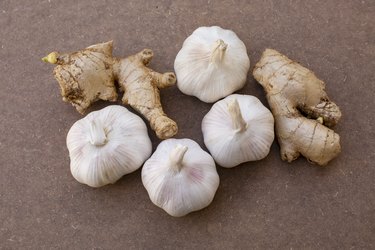
Both garlic and ginger can lower your blood pressure, but that doesn't mean you should try to lower your BP by drinking lots of garlic ginger tea. Normal amounts in food are generally safe, but garlic-ginger tea in excess, on top of your medications, may have an effect that could be harmful.
Video of the Day
Video of the Day
Effects of Garlic and Ginger
Garlic may help protect against stroke and atherosclerosis by keeping blood platelets from sticking together, according to the University of Rochester Medical Center. There's some conflicting evidence that taking garlic supplements might lower cholesterol and a bit more evidence that they can lower blood pressure, notes the National Center for Complementary and Integrative Health (NCCIH).
Garlic in food is perfectly safe in the amounts you'd typically find, the NCCIH says. Enjoy that turkey meatloaf or broccoli with garlic and oil. However, garlic gives some people stomachaches and, in supplement form, may interfere with medications and increase bleeding risks, NCCIH says.
Ginger is often used to treat nausea and stomach problems, according to the University of Rochester Medical Center (URMC). As a spice, it's generally safe to consume in foods, NCCIH says. Ginger can cause bloating and heartburn in some, the university notes. There are no major interactions between ginger and any foods or medicines, but some experts think it may interact with blood-thinning medications, URMC says.
It sounds like each of these spicy delights have health benefits, are generally safe in foods and might be considered alone as a supplement in some people. But while garlic or ginger can have health benefits, you'll need to proceed gingerly when thinking about consuming the combination of the two.
Is Garlic Ginger Tea Good for BP?
For most people with blood pressure concerns, no, it's not. According to Michigan Medicine, if you take any medication for high blood pressure, you shouldn't take supplemental ginger without speaking to your doctor.
This is because, as the Icahn School of Medicine at Mount Sinai explains, the combination of ginger and blood pressure medication may lower blood pressure too much and can also raise the risk for irregular heartbeat.
And combining ginger with garlic is an even worse idea, according to Guy L. Mintz, MD, director of Cardiovascular Health & Lipidology at Northwell Health's Sandra Atlas Bass Heart Hospital in Manhasset, New York. "Garlic and ginger should not be used together because of their effects on blood pressure, especially in patients already on hypertensive therapy," he says.
All in all, it's best to avoid supplements and teas that affect your blood pressure, like garlic and ginger, until you talk to your doctor about them — especially if you take medication for high blood pressure, per the National Library of Medicine.
Garlic and Blood Pressure
Garlic alone may be considered as a supplement for patients with high blood pressure, or hypertension, Dr. Mintz says.
Garlic can reduce blood pressure, slightly reduce cholesterol, has anti-inflammatory effects and may protect against cardiovascular disease, Dr. Mintz points out. It reduces blood pressure by causing blood vessels to relax. For these reasons, your doctor may suggest taking a garlic supplement if you're already taking medication for high blood pressure.
According to Dr. Mintz, most people feel fine on garlic supplements, but about one in three patients experience side effects, including gastrointestinal-related effects such as belching, flatulence and reflux. There's no strong evidence showing that garlic interacts with any standard blood pressure or cholesterol medications, he says.
Ginger and Blood Pressure
While it seems that ginger alone can reduce both systolic (upper number) and diastolic (lower number) blood pressure, these effects may be seen more in certain groups of people based on age, how much ginger they take and how long they've been taking it, according to a June 2019 review of several studies in the journal Phytotherapy Research.
Dr. Mintz confirms this. "Ginger can have a modest effect to lower blood pressure," he says. Ginger has also been shown to cause blood vessel relaxation, Dr. Mintz says. But as Icahn School of Medicine notes, adults should keep it to a minimum of no more than 4 grams of ginger per day, including from meals, and always check with your doctor to make sure it won't interact negatively with your medications or other conditions.
- University of Rochester Medical Center: "Ginger"
- University of Rochester Medical Center: "Garlic”
- National Center for Complementary and Integrative Health: “Ginger”
- National Center for Complementary and Integrative Health: “Garlic”
- Guy L. Mintz, MD, FACP, FACC, FNLA, cardiologist, director of Cardiovascular Health & Lipidology, Northwell Health’s Sandra Atlas Bass Heart Hospital, Manhasset, New York
- Michigan Medicine: “Ginger”
- Icahn School of Medicine at Mount Sinai: “Ginger”
- Phytotherapy Research: “Does Ginger Supplementation Lower Blood Pressure? A Systematic Review and Meta-Analysis of Clinical Trials”
- National Library of Medicine: "Taking Dietary Supplements With Heart, Blood Pressure, or Cholesterol Medicines"
Is this an emergency? If you are experiencing serious medical symptoms, please see the National Library of Medicine’s list of signs you need emergency medical attention or call 911.